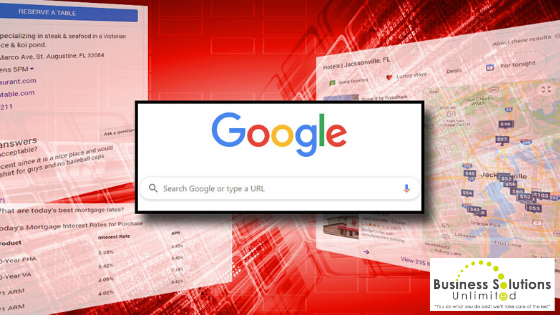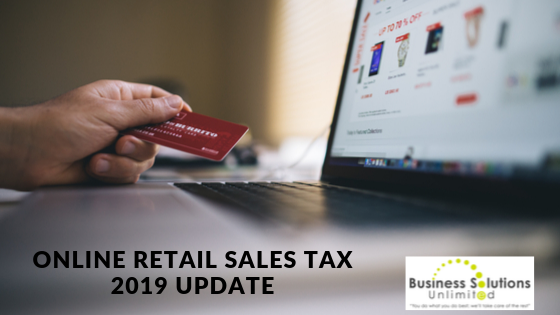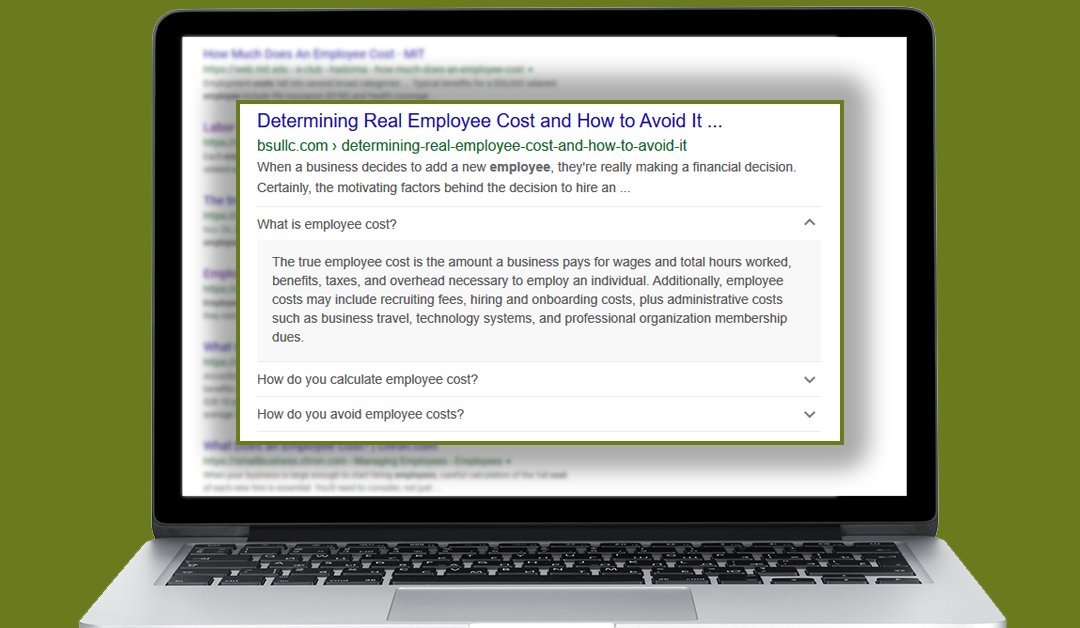
by admin
If you have a business website, lead generation would probably be its most important objective.
Google released its Lead Gen UX Playbook in 2019 filled with best practices on how to create a successful lead generation page that will motivate your visitors to take action.
Below are several takeaways from the playbook that you could use not just for a lead generation page, but throughout your website.
Make Your Call to Action Descriptive
For a business, the call to action (CTA) is the most important element on your webpage. After all, the ultimate purpose of your business website is to initiate some type of action.
Google suggests avoiding making generic CTAs. Instead, make your CTAs descriptive by stating precisely what the user should expect. Make your CTAs beneficial.
Instead of “Learn More”, or “Call Now”, try
- Learn More About ‘this topic’
- Get Started with Your Free Subscription
- Call Now for More Information About…
Benefits of Descriptive CTAs According to Google:
- Links will be more accessible
- Links will be more enticing to users and potentially more persuasive
- Users will feel more confident as they click from page to page
- More keywords on the page will help search-engine optimization
- Meaningful links will stand out and help users who are scanning the page
Communicate a Clear Value Proposition
This starts with a clearly stated headline that swiftly communicates to the viewer how your product, service, or information can solve their problem. The key is to get the viewer of your webpage to quickly understand the value of the content on your page.
Once they see value on your page, they’re more likely to take the next step as described in your CTA.
Gain Trust Through Social Proof
Psychologically, some form of validation may be instrumental for your website viewers before they make a decision to take action on your CTA. To quote the Google playbook:
“Social proof is a psychological phenomenon where people reference the behavior of others to guide their own behavior”
Social proof can be communicated through a variety of methods, including:
- Testimonials
- Number of people using services and products
- User ratings
Follow Google’s Guidance on Webpage Design Best Practices
Google includes several design best practices in their playbook. They include:
Remove automatic carousels: Basically, viewers will ignore image and content carousels on websites.
Don’t use full-page interstitials: Interstitials are used to cover webpage content the viewer was expecting with other content, such as a promotion. Usually, viewers must click to move past the interstitials. When viewers encounter these, they typically will hit the back button.
Use legible font sizes: Readability throughout a website site should be the goal for every business. The ideal font size for the main body text is 16 px.
The Google Lead Gen Playbook has many best practice tips and research on making a successful lead generation landing page. We suggest you take a moment to look through the document and see what you can use to increase conversion on your landing pages.
Do You Have Time to Implement these Best Practices?
If you don’t, we do. That’s why we’re here.
Give Business Solutions Unlimited a call at (904) 429-4588 and let’s see how we can help your business today.
Lead Generation Landing Page Frequently Asked Questions (FAQ)
Below are FAQs about online searches.
What is a lead generation landing page?
Lead generation landing pages typically are focused on one value proposition with the intent on capturing visitor’s information through the lead contact form or phone call.
What is a CTA?
CTA is an acronym for call to action. On a website, commercial or printed advertisement, the CTA helps to convert the viewer to take a desired action such as a phone call or click.
What is a value proposition?
A value proposition presents the benefit of your product, services, or information. It communicates what problem your business can solve for a client. Value propositions can be a key element that separates your business from competitors.
What are examples of social proof that can help increase credibility on a website?
Social proof can help guide people’s behaviors when making a decision to purchase from or contact a business through a website. Examples of social proof may include testimonials, the number of people using services and products, and user ratings.

by admin
Tis’ the season of giving. As the holidays arrive, so does the desire to donate to charities.
Below we’ve gathered the following small business tips and guidelines for charitable giving:
- Why businesses should consider donating
- How to choose charitable organizations
- How to make sure donations are tax-deductible
Why Small Businesses Should Consider Donating to a Charity
Donating to local charities is a great way for small businesses to demonstrate their connection to their community.
Let’s face it, most small businesses are dependent on their community for their success. Showing that you care about local causes helps to connect your business to the community.
Local giving is excellent for your local PR. Plus it’s beneficial for the local charities that are making a difference in your community.
As a bonus, many local charities will publicize your support on their social media platforms and newsletters.
How to Choose Charitable Organizations to Donate To
If you’re a small business, chances are local charities will seek you out for donations. While there are benefits to making contributions to several charities, it’s a good idea to put your time, effort, and energy into organizations that match your values and interest.
Consider connecting your business to a local charity as opposed to a national organization.
Consider finding an organization that makes sense with your brand.
For example:
- Real estate office could connect with a homeless charity
- Restaurant may consider working with a food bank
- Outdoor recreational business could support an environmental cleanup organization
Take the time to learn about the organizations. Find out what their true needs are and how your business can help. Not just for the holidays, but year-round.
For example:
- Does the charity need event sponsors?
- Do they need volunteers?
- Do they need ongoing financial support?
Another consideration in choosing a charitable organization might be ensuring your giving is tax-deductible.
How to Make Sure Charitable Donations are Tax Deductible
There are tax benefits when donating to charities. However, there are rules on whether donations are tax-deductible.
As with most tax deduction questions, it’s a good idea to speak with a tax advisor about charitable deductions.
Below, we’ve provided frequently asked questions on what makes charitable donations tax-deductible.
How Does Charitable Donation Tax Deductions Depend on Your Business Type?
How you claim charitable deductions depends on how you’ve set up your business.
Corporations can include their charitable donations on their income tax returns. However, this does not include S corporations.
Owners of businesses that are not corporations would make their deduction through the personal portion of their tax returns.
What Types of Donations Can a Small Business Deduct from their Taxes?
Businesses can deduct the following donations:
- Cash contributions
- In-Kind contributions through gifts of property or equipment
- Mileage and travel expenses incurred when working with a charitable organization
- Supplies purchased and used while volunteering
It’s important to document your giving throughout the year as proof of your donations.
What Types of Charitable Donations Cannot Be Deducted by Small Businesses?
Your time spent volunteering for a charitable organization cannot be deducted. This includes time spent by your employees as well.
What Types of Charitable Organizations Can a Business Donate to for Tax Deduction Qualification?
In order for a donation to be tax-deductible, the charity needs to be an IRS recognized 501(c)(3) organization.
What are the Limitations for Business Tax Deductions for Charitable Donations?
According to the IRS, limitations on deductions for charitable donations are 50 percent of adjusted gross income computed without regard to net operating loss carrybacks.
The 50% rule applies to the following types of charitable organizations:
- Public charities
- Private operating foundations
- Private foundations that distribute donations to private foundations
- Private foundations that distribute donations to public charities within 2.5 months from time business donations were made
- Private foundations that pool contributions to pay to public charities
Contributions to certain types of private foundations are limited to 30 percent adjusted gross income computed without regard to net operating carrybacks. These organizations may include:
- Veterans organizations
- Fraternal societies
- Cemetary organizations
How You Could Use Our Services for Charitable Donations
Finding a qualified charitable organization to connect your business with may take the time you don’t have. A virtual assistant firm like Business Solutions Unlimited can help you search for the right organization plus find out what needs they have.
If you’d like to explore the benefits of using a virtual assistant firm for this as well as many other tasks, give us a call at (904) 429-4588 and let us get to work for you.

by admin
It’s starting to look like an optimized Google My Business profile may be just as important to local businesses as their website.
Nearly half of Google searches resulted in zero clicks. That means searchers (your potential customers) found the information they were looking for straight from Google’s search results.
Less than half of Google searches resulted in an organic click to non-Google-owned websites. These searchers proceeded to click-thru to a website—hopefully yours.
Those were findings based on data provided by a marketing analytics firm, Jumpstart, earlier in 2019.
Here are the stats for searcher clicks that are creating a buzz among marketers and businesses:
- Zero-Click Searches: 48.96%
- Organic Clicks to Non-Google Sites: 41.45%
- Organic Clicks to Google Sites: 5.90%
- Paid Clicks to Google Sites: 0.11%
- Paid Clicks to Non-Google Sites: 3.58%
What are Google Sites?
A while back, that would be Google properties like Youtube.
Now, Google serves up a variety of search result options that can impact businesses in the travel, hotel, flights, shopping, and food delivery fields. That list will continue to grow over time.
Where are those Zero-Click Searchers Going?
Google has been on a mission to provide searchers with as much value as possible in the search results.
When a searcher requests information on a local business, Google likes to serve up the following on their results page:
- Your business phone number plus a click to call button
- A way to send a message to your business
- Ability to ask a question about your business
- Ability to read or posts reviews
- Your menu if you’re a restaurant
- Your special offers and prices
Not too long ago, your potential customers would have to visit your website to find this information.
Now, Google is showing this information from businesses that have provided this information through their Google My Business profile or markups on their websites.
Smart businesses understand that a high-performance Google My Business profile can increase their online visibility in both searches and maps.
More visibility means more customers and revenue.
So, Are Websites Necessary?
They sure are.
As the stats above show, there are still considerable clicks to non-Google sites.
Additionally, Google and other search engines will consistently crawl your site seeking answers to searcher questions and queries.
Businesses can make it easier for Google to gather this information by providing Schema markups on their websites.
Schema markup provides structured data that search engines use to show searchers facts and particulars about topics they’re searching.
There are thousands of schema markups that can be built into websites. Businesses can use markups to share:
- Business info such as hours, location, etc.
- Restaurant menus
- Events
- Products and pricing
- Articles
Providing Schema markups on your website is a good way to make your site the hub of your online presence.
Do You Have Time to Manage Your Online Presence?
If you don’t, we do. That’s why we’re here.
Give Business Solutions Unlimited a call at (904) 429-4588; so we can start helping you today.
Online Search Frequently Asked Questions (FAQ)
Below are FAQs about online searches.
What is a Zero-Click Search?
Zero-click searches generally occur when a search engine result page displays the answer a searcher is seeking. When the search result page satisfies the searcher’s intent, there is no need for further clicks.
What is Schema Markup Code?
Schema markup is code placed on websites that helps search engines understand the data presented on webpages. This helps search engines provide informative data for their users.

by admin
Remote online sellers face a changing legislative environment when complying with online sales taxes.
A bill (Senate Bill 126) recently submitted in Florida for the 2020 legislative session aims to require local and remote Internet sellers to collect and pay sales taxes. Currently, Florida consumers are responsible to pay sales taxes on online purchases from out of state sellers.
The Florida bill follows similar actions taken by more than 40 states after a 2018 U.S. Supreme Court ruling (South Dakota v. Wayfair Inc.) allowing South Dakota to collect sales tax from online purchases regardless of a physical presence within the state.
If passed, the Florida bill would impact remote sellers with over $100,000 in sales or 200 or more retail sales transactions annually.
Remote sellers encompass a range of businesses from large corporations like Amazon and Walmart to small home-based businesses. Basically, states consider any business without a physical state presence that a makes an internet sale in that state to be a remote seller.
Regardless of your business size, if you’re a remote internet seller you should become knowledgeable about the internet sales tax laws in States where you make sales.
Below, we provide helpful information on the current state of internet sales taxes.
States that Require Remote Sellers to Pay Internet Sales Taxes
Remote sellers that have established an economic nexus within a state that requires an internet sales tax may be required to collect sales taxes.
An economic nexus is established when remote online sellers make sales in a state even when they do not have a physical presence. State laws on economic nexus vary with regards to the sales threshold that would trigger sales taxes.
Thresholds vary from state to state.
Guide to Economic Nexus Thresholds that Trigger Remote Sellers to Collect Sales Tax on Online Sales
Below is an October 2019 sales amount threshold snapshot of states requiring online sales taxes.
- Alabama: $250,000
- Arizona: $200,000 in 2019, $150,000 in 2020, $100,000 2021 and beyond
- Arkansas: $100,000 or 200 separate sales transactions
- California: $500,000
- Colorado: $100,000
- Connecticut: $100,000 or 200 separate sales transactions
- Georgia: $250,000 or 200 separate sales transactions s ($100,000 starting January 1, 2020)
- Hawaii: $100,000 or 200 separate sales transactions
- Idaho: $100,000
- Illinois: $100,000 or 200 separate sales transactions
- Indiana: $100,000 or 200 separate sales transactions
- Iowa: $100,000
- Kansas: $0 (all remote sellers meet the state’s economic nexus regardless of size)
- Kentucky: $100,000 or 200 separate sales transactions
- Louisiana: $100,000 or 200 separate sales transactions
- Maine: $100,000 or 200 separate sales transactions
- Maryland: $100,000 or 200 separate sales transactions
- Massachusetts: $100,000
- Michigan: $100,000 or 200 separate sales transactions
- Minnesota: $100,000 or 200 separate sales transactions
- Mississippi: $250,000
- Nebraska: $100,000 or 200 separate sales transactions
- Nevada: $100,000 or 200 separate sales transactions
- New Jersey: $100,000 or 200 separate sales transactions
- New Mexico: $100,000
- New York: $500,000 and 100 separate sales transactions
- North Carolina: $100,000 or 200 separate sales transactions
- North Dakota: $100,000
- Ohio: $100,000 or 200 separate sales transactions
- Oklahoma: $10,000
- Pennsylvania: $100,000
- Rhode Island: $100,000 or 200 separate sales transactions
- South Carolina: $100,000
- South Dakota: $100,000 or 200 separate sales transactions
- Tennessee: $500,000
- Texas: $500,000
- Utah: $100,000 or 200 separate sales transactions
- Vermont: $100,000 or 200 separate sales transactions
- Virginia: $100,000 or 200 separate sales transactions
- Washington: $100,000
- Washington DC: $$100,000 or 200 separate sales transactions
- West Virginia: $100,000 or 200 separate sales transactions
- Wisconsin: $100,000 or 200 separate sales transactions
- Wyoming: $100,000 or 200 separate sales transactions
How Remote Sellers Collect Sales Taxes on Online Sales
Many states have enacted laws requiring remote online sellers to register, collect, and file sales taxes on purchases where they’ve established an economic nexus.
If you have an online ecommerce business, you also have to keep track of all sales tax jurisdictions—from local towns to state level.
Many businesses making remote online sales will use an automated service that tracks multiple tax jurisdictions and applies the proper sales tax amount on checkout.
Additionally, many remote sellers have opted to sell their products with third-party marketplaces such as Amazon, eBay, or Etsy. These third-party marketplaces handle the sales tax collection directly with the consumers.
Are You a Remote Seller? Delegate Your Online Sales Tax Research.
If you’re a remote online seller, you’ll be required to keep up with the various state laws pertaining to online sale taxes. A Virtual Assistant can take on this research task plus find solutions that could benefit your business when dealing with multiple locations.
If you’d like to explore the benefits of using a Virtual Assistant Firm, give us a call at (904) 429-4588 and let’s see how we can help your business.
Online Sales Tax and Remote Sellers Frequently Asked Questions (FAQ)
Below are FAQs about online sales taxes and remote sellers.
What is a remote seller?
Remote sellers are out-of-state sellers. Ranging from large corporations to small home-based businesses, remote sellers sell products to consumers where they do not have a physical presence.
Do remote sellers have to collect sales tax on all internet sales?
In many states, online sellers are required to register to collect sales tax on purchases made in states they’ve established a physical presence. Since the U.S. Supreme Court South Dakota v. Wayfair Inc. ruling, many states have enacted laws requiring remote online sellers to collect sales taxes on purchases where they’ve established an economic nexus.
What are economic nexus laws?
An economic nexus is established when remote online sellers make sales in a state even when they do not have a physical presence. With an online sale, these businesses have essentially established an economic presence in a state. State laws on economic nexus vary with regards to the sales threshold that would trigger sales taxes. Thresholds may vary from $10,000 to $500,000 in sales or a certain number of sales transactions.
How do remote online sellers collect and file sales taxes in states where they do not reside?
Collecting sales tax on internet sales requires a business to get a Sales Tax Permit for the State where they make sales. Each state varies on method and fees for the permits. Businesses need to track multiple sales tax amounts since states vary in the taxes owed for purchases. Some businesses use automated online services to apply the proper sales tax amount for purchases made online. Additionally, many remote sellers have opted to sell their products with third-party marketplaces such as Amazon, eBay, or Etsy. These third-party marketplaces handle the sales tax collection directly with the consumers.

by admin
How would you like to take up more real estate on Google’s search results page? Would you like to increase the discoverability of your website on Google Assistant devices?
You can by simply adding FAQPage Structured Data markup to your webpages.
In May 2019, Google rolled out a FAQPage Structured Data feature that businesses can use on their websites. The feature increases opportunities for businesses to feature helpful webpage content on Google Search result pages.
In many cases, websites implementing the structured data markup have dominated search results on specific topics.
By increasing the real estate on search result pages to display FAQs, these websites will have essentially crowded out competitors.
Additionally, displaying the FAQs online strengthens the perception of business’ knowledge on the specific topic and their helpfulness on their services. This would be an invaluable step toward establishing your expertise and authority in your industry.
Google Guidelines on FAQPage
Google provides guidance on how businesses may use FAQPage Schema on their website.
Basically, Google requests using the markup when your page has a list of questions and answers.
It’s important to note that the Q&As have to be visible on the page.
Valid uses for the markup can be a product, services, or topics page that lists FAQs.
Invalid uses of the markup include:
- A product page where visitors can actively submit questions
- Advertising purposes
- Content that may be considered obscene, profane, sexually explicit, graphically violent, promotion of illegal or dangerous activities, hurtful or harassing language
It’s also important to note that Google does not guarantee that this content will be made available on their search result page:
Disclaimer: Google does not guarantee that your structured data will show up in search results, even if your page is marked up correctly. To determine whether a result gets a rich treatment, Google algorithms use a variety of additional signals to make sure that users see rich results when their content best serves the user’s needs.
Potential Uses of this FAQPage Feature?
Business Solutions Unlimited has started using this feature on webpages focused on knowledge-based topics. Recently, we used it on a blog post about determining employee costs.
We’re also using the markup on this webpage. We see this feature as an opportunity to provide helpful information for searchers and increase our online presence on search pages. Additionally, by displaying this content online, it will help increase our reputation as subject matter experts.
Below, we’ve brainstormed how some businesses might be able to use this feature.
How Could a Restaurant Use this FAQ Feature?
Without being promotional, restaurants could provide FAQs on a variety of topics. For example, they could answer the following questions on their menu page about gluten-free meals, sources for their ingredients, special food preparation techniques, and seasonal dishes. On their general page, they could include information on seating, notable history of the restaurant, whether they take reservations, etc.
How Could an Attorney Use this FAQ Feature?
Attorney websites could be a treasure trove for FAQs topics. Questions and answers could be provided on the firm’s specialties. Answers could be provided on education topics such as specific criminal law and family law topics.
How Could a Vacation Rental Business Use this FAQ Feature?
FAQs displayed on the search page could answer many questions a potential renter might have. Topics for Questions and Answers might include the size of the property, how many people can be accommodated, distance to specific notable locations (beach, downtown, etc.)
At the moment, not many businesses have implemented this feature on their webpages.
As stated above, we believe this is a wonderful opportunity for businesses to use this new feature to further promote their expertise plus increase their visibility online.
Don’t Have Time to Learn About and Implement this Feature on Your Website?
We understand that many business owners might consider implementing FAQPage Markup on their page just one more task to add to their busy day. That’s where we can help.
Give Business Solutions Unlimited a call at (904) 429-4588 and let us start helping you and your business today.
FAQPage Structured Data Frequently Asked Questions (FAQ)
Below are FAQs about FAQPage Structured Data.
What are Frequently Asked Questions (FAQs)?
Frequently Asked Questions (FAQs) are questions and answers to a specific topic. A website may include a FAQ page for visitors to gain answers to questions about the company or individual behind the website, details on products and services provided by the business or individual. Webpages dedicated to specific topics, products, or services may also include FAQs on the subject matter.
What is FAQPage Structured Data?
FAQPage Structured Data is Schema.org markup used by website content creators to help show what is considered rich results on Google’s search page. Google allows markups to be built by using JSON-LD or Microdata on webpages. Markup FAQ content may be eligible for a collapsible menu under search engine results on specific topics. When clicked, the menu reveals the answer. This markup can be a powerful tool for businesses to use to help increase their online presence and strengthen their reputation on search pages.
How Many FAQs can be displayed on search result pages using FAQPage Structured Data?
Currently, three FAQs are actively displayed on search result pages. A provided link allows the searcher to uncover up to seven more FAQs on the search result page.
How is FAQPage Structured Data used with Google Assistant?
Google uses structured data to provide content for voice-oriented Google Assistant devices. This provides an opportunity for businesses to increase their presence on multiple devices beyond basic web searches.
Page 2 of 11«12345...10...»Last » 




